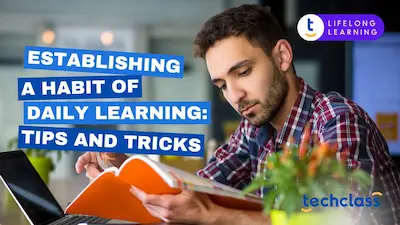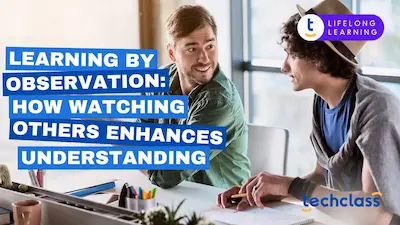
In today’s ever-evolving job market, one of the smartest investments you can make in your professional life is developing transferable skills. These are the core abilities that move with you across industries and roles, enabling you to adapt, grow, and thrive in almost any work environment. For people committed to continual self-development, these skills are essential.
Whether you're changing careers, re-entering the workforce, or simply upgrading your capabilities, learning with the goal of building transferable skills sets you up for long-term success.
Transferable skills are the abilities you carry with you from one job or experience to the next. Unlike job-specific knowledge, these skills remain relevant no matter where your career takes you. They include both soft skills like communication and adaptability, and hard skills like data analysis and project management.
Think of transferable skills as your career currency, the more you develop, the more options you have.
Let’s look at some of the most valuable transferable skills you can focus on strengthening:
Clear writing, public speaking, active listening, and being able to adjust your message to suit different audiences are critical across roles, from team meetings to client negotiations.
Strong communicators can bridge gaps between departments, resolve misunderstandings quickly, and present ideas that inspire action or support.
This involves identifying issues, analyzing causes, and crafting innovative solutions. Whether you're troubleshooting tech issues or resolving interpersonal conflicts, problem-solving is vital.
It shows employers you can think critically under pressure and contribute to meaningful improvements in processes, services, or outcomes.
Being able to adjust to change, learn new systems, or pivot strategies is key in a world where work environments and tools evolve constantly.
Adaptable individuals are often seen as resilient and proactive, traits that make them valuable assets during times of organizational change.
Prioritizing tasks, meeting deadlines, and organizing work efficiently help you stay productive in any job, whether working independently or managing a team.
Developing this skill ensures that you can juggle competing demands without sacrificing quality or missing critical deadlines.
This includes working well with others, managing conflict, and contributing meaningfully to team goals. Strong collaboration creates more successful, harmonious workplaces.
Being a reliable team player also boosts trust and morale, leading to stronger networks and more rewarding professional relationships.
Leadership isn’t limited to formal management roles. Mentoring peers, taking initiative, and guiding projects all demonstrate this valuable skill.
Effective leaders empower others, create clarity in uncertain situations, and help teams stay focused on shared goals.
Whether interpreting data or evaluating business strategies, analytical thinking lets you make informed decisions, a crucial skill across industries.
This ability enables you to back up recommendations with evidence, spot trends, and solve complex challenges systematically.
Self-awareness, empathy, and the ability to manage emotions are increasingly recognized as key drivers of performance and collaboration.
It helps build stronger relationships at work, defuse conflicts early, and create a more inclusive and understanding workplace environment.
If you're wondering what transferable skills you already have, consider these steps:
You don’t need to enroll in formal degree programs to grow your skill set. Here’s how you can build transferable skills through everyday learning:
Stretch roles at work or side projects are great ways to build new skills. Volunteer to lead meetings, organize events, or test new tools.
Platforms like TechClass offering short courses and certifications can sharpen both soft and technical skills quickly. Look for hands-on learning where you apply knowledge immediately.
Professional networks, hobby clubs, or nonprofit boards can give you real-world practice in leadership, communication, and collaboration.
Journaling or documentation helps you recognize how far you’ve come, and where to focus next. Think in terms of "how I used this skill, and what I achieved."
Ask questions, seek feedback, and stay curious. These habits keep you engaged and continuously growing.
Once you’ve identified and started developing your skills, the next step is to leverage them. In your resume and job application tailor your skills to each role and showcase outcomes tied to your skills. Moreover, in interviews tell stories that highlight your transferable skills in action using the STAR method (Situation, Task, Action, Result). If you’re pivoting careers, transferable skills bridge the gap between your background and your next goal. Highlight these skills in networking conversations and informational interviews to show how you bring value.
At its core, building transferable skills is an ongoing journey, one that fits perfectly into a lifelong learning mindset. Every experience, challenge, and course you take is an opportunity to gain new tools for your career toolkit.
By continuously developing transferable skills, you not only remain relevant in a changing job market, you also gain the confidence to pursue new opportunities, solve meaningful problems, and navigate change with resilience.
So whether you’re taking a course, mentoring a peer, or tackling a new project, you’re doing more than adding lines to your resume. You’re future-proofing your career, one skill at a time.
Start today. Reflect on your strengths, seek out growth opportunities, and treat each new experience as a training ground. Because the more you learn, the more transferable and valuable, you become.
Identifying transferable skills is a critical step for career longevity, but creating a consistent environment for employees to develop these abilities requires more than just encouragement. Without a structured framework, skill development often becomes fragmented, making it difficult for teams to bridge the gap between their current capabilities and future roles.
TechClass bridges this gap by providing an intuitive platform where learners can access structured Learning Paths and a premium Training Library focused on essential soft skills and leadership. By leveraging AI-driven insights and interactive certifications, TechClass helps organizations automate the upskilling process. This ensures that every team member has the tools to build a versatile, future-proof skill set while allowing management to track growth and performance in real-time.

.webp)
